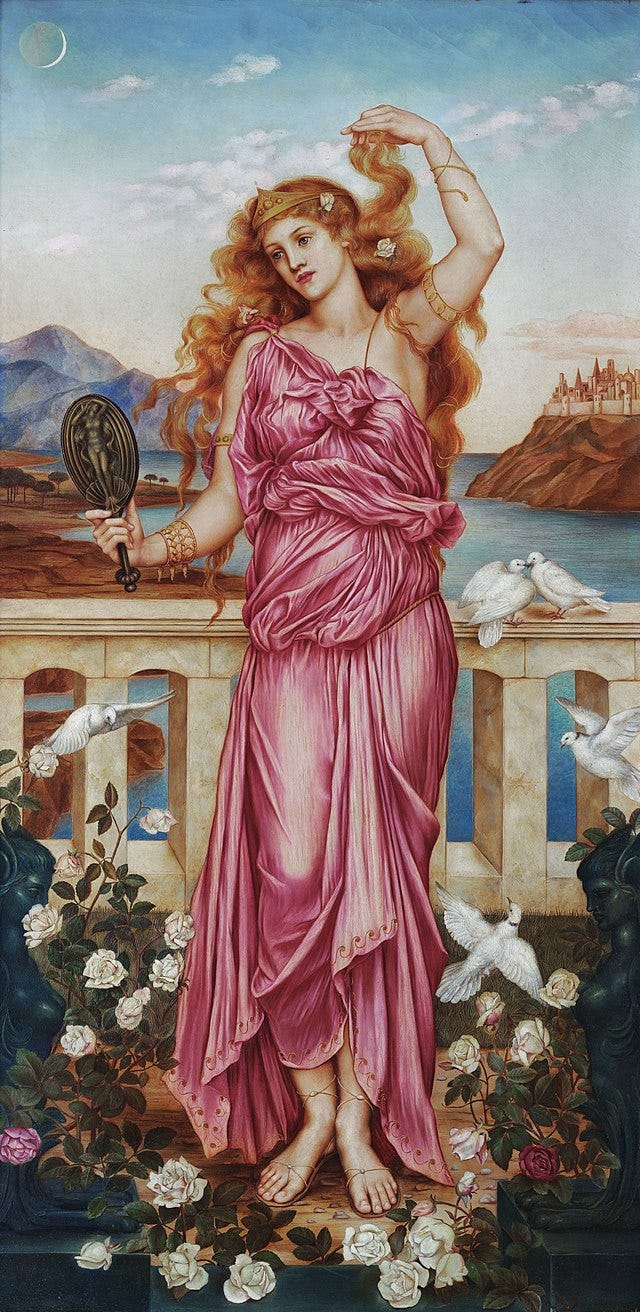Limerence
Ever come across this word? It means an obsessive longing for another person's love, and literature is full of it
William Butler Yeats, ‘No Second Troy’
Why should I blame her that she filled my days With misery, or that she would of late Have taught to ignorant men most violent ways, Or hurled the little streets upon the great, Had they but courage equal to desire? What could have made her peaceful with a mind That nobleness made simple as a fire, With beauty like a tightened bow, a kind That is not natural in an age like this, Being high and solitary and most stern? Why, what could she have done, being what she is? Was there another Troy for her to burn?
What we love about this poem…
We love the way Yeats succumbs to limerence, practically wallows in it. Right from the start he readily acknowledges his helplessness to combat his feelings for his beloved by phrasing them in terms of four rhetorical questions (from ‘Why should I blame her?’…through to ‘Was there another Troy for her to burn?’). He exonerates her completely from making him suffer because she was not consciously cruel, she was just being herself: ‘What could she have done, being what she is?’ He suffers, yet he is her great defender. That, he seems to be saying, is true love.
Yeats’s unrequited love for Maud Gonne is legendary. He courted her for three decades and proposed to her four times. He also later proposed to Maud’s daughter Yseult, who likewise rejected him. On the positive side, this yearning did inspire some powerful poetry…
About the Author
William Butler Yeats (1865-1939) was an Irish poet and playwright. He was a central figure in the Irish Literary Revival and won the Nobel Prize for Literature in 1923.
To Read Alongside…
Yeats found the work of Bengali writer Rabindranath Tagore utterly beautiful and also wrote the introduction to the second English edition of Tagore’s Gitanjali: Song Offerings (Tagore’s own translation, 1912), a text that precipitated the awarding of the Nobel Prize for Literature to Tagore in 1913.
The shepherd Gabriel Oak in Thomas Hardy’s novel Far from the Madding Crowd longs for Bathsheba and suffers when she falls in love with the wrong man. But he patiently bides his time and is staunchly loyal to her. ‘I shall do one thing in this life - one thing certain - that is, love you, and long for you, and keep wanting you till I die. And at home by the fire, whenever you look up there I shall be— and whenever I look up, there will be you.’
In Edmond Rostand’s play Cyrano de Bergerac, the famously bulbous-nosed Cyrano helplessly adores Roxanne, but she is in love with the handsome but inarticulate Christian, who enlists the verbally gifted Cyrano to woo Roxanne on his behalf—first with beautifully written, passionate love letters and then by hiding in shadow while feeding Christian words of adoration to speak to Roxanne as if they are his own. Only on Cyrano’s deathbed does Roxanne realize that the person she really loved was him, and that the words of love she thought were Christian’s were actually Cyrano’s.
Jane Austen’s novels are filled with characters in silent and refined agonies of limerence because they think the object of their passion does not love them. Darcy seems cold but inwardly smoulders with inexpressible passion for Lizzie in Pride and Prejudice. And in Persuasion, Captain Wentworth longs for Anne and finally manages to tell her how he feels in that letter.
Finally, Henrik Ibsen’s last play, When We Dead Awaken, hinges on the obsessive and unrequited loved of a woman, Irene, for Rubek, the artist whose muse she was. Decades after he used her for his art and then cast her aside, she has tracked him down—and she carries a dagger in her skirts…
Suggest a LitHit!
Tell us your own favourites from literature you've read, and we can feature you as a Guest Curator if you like. Just email us with the following information:
Your full name
The title of the book you're suggesting
The location of the excerpt within the book (e.g., "in the middle of chapter 5"), or the excerpt itself copied into the email or attached to it (in Word)
Why you love it, in just a few sentences
About LitHits
LitHits helps you make time for reading by bringing you unabridged excerpts from brilliant literature that you can read on the go, anytime or any place. Our curators carefully select and frame each excerpt so that you can dive right in. We are more than a book recommendation site: we connect you with a powerful, enduring piece of literature, served directly to your mobile phone, tablet or computer.
You might also enjoy...
Feedback
We'd love to hear your thoughts on our newsletter:
kshepherdb@yahoo.co.uk
Graphic design by Sara Azmy
All curation content © 2024 LitHits. All rights reserved.


